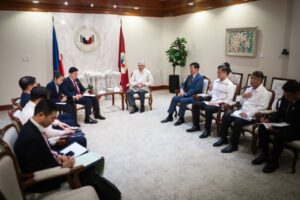
Following the Philippine Statistics Authority (PSA)’s recent announcement on the country’s gross domestic product (GDP) growth rate in the fourth quarter of 2023, Department of Trade and Industry (DTI) Secretary Alfredo Pascual presented the country’s economic output in the past year during the Italian Chamber of Commerce in the Philippines, Inc. (ICCPI) Business Luncheon on February 1 at Dusit Thani Manila in Makati City.
Highlighting the Philippines as a strong contender for the “Rising Asian Tiger Economy” status before industry stakeholders and policymakers, Secretary Pascual reported, “The Philippine economy grew by 5.6% in 2023, outpacing major economies in Asia, such as China (5.2%), Vietnam (5.0%), and Malaysia (3.8%) based on the latest available data.”

He also reported sectors such as financial and insurance activities saw a remarkable growth of 11.8%. At the same time, wholesale and retail trade, repair of vehicles and motorcycles, and construction also contributed significantly, with growth rates of 5.2% and 8.5%, respectively.
According to the Secretary, the full-year GDP for 2023 is 8.6% higher than the pre-pandemic level, which validates the present administration’s holistic and innovative approach to the implementation of the Philippine Development Plan 2023-2028.
Apart from this, the country’s robust economic recovery was marked by an 11.2% acceleration in total investments, showing a significant shift from the 1.4% contraction in Q3. The government’s strategic efforts also resulted in the approval of PHP1.26 trillion (USD22.6 billion), achieving a 73% increase from 2022.
Secretary Pascual explained the government leverages on the significant investment opportunities offered by key strategic sectors. He stressed the Philippines aims to become a regional hub for smart and sustainable manufacturing and services, leveraging its young and talented workforce, rich natural resources, and strategic geographic location.
Moreover, he presented the country’s focus on green metals, green minerals, and renewable energy potential. He underscored opportunities in mineral exploration, processing, and battery production, recognizing the Philippines’ potential to contribute significantly to the electric vehicle (EV) industry.
With the abundance of renewable energy (RE) sources, various studies indicate the Philippines’ renewable energy potential accounting to 492 GigaWatts (GW), which presents the country’s advantages to become a hub of EV manufacturing and assembly.
The Secretary also presented the investment opportunities in key areas such as semiconductors, information technology (IT) infrastructure, agribusiness, IT and Business Process Management (IT-BPM), and creative industries. He added a National Innovation Gateway is being built to bridge the gaps in the country’s innovation and entrepreneurship ecosystem.
Aside from investment opportunities, the government also initiated key reforms promoting trade and investments. These include the Corporate Recovery and Tax Incentives for Enterprises (CREATE) Act, the liberalization of renewable energy rules, the establishment of Green Lanes for Strategic Investments, and the newly signed Ease of Paying Taxes Act, among others.
Looking ahead, Secretary Pascual mentioned the country’s promising economic outlook for 2024 which will be driven by private consumption, falling oil prices, robust public spending, greater investments, macroeconomic fundamentals, investment-grade credit ratings, structural reforms, and increased demand for Philippine exports.
Additionally, international engagements, including negotiations for the Philippines-EU Free Trade Agreement (FTA), and the newly signed Philippines-South Korea FTA will further reinforce the country’s commitment to foster economic growth and international cooperation.




